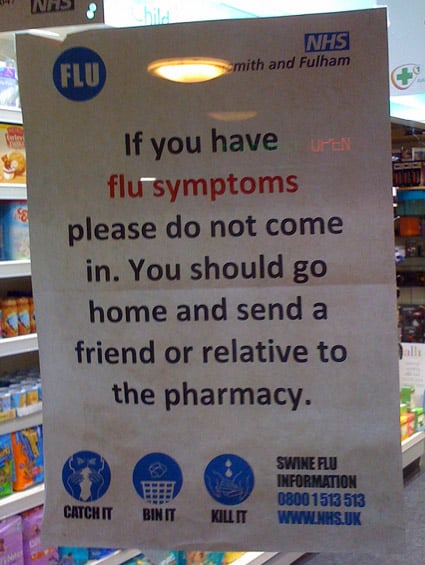Tom’s War Story: Go with the flow

Tom Williams, Principal of Point Forward is confronted with his own health concerns, and with some unexpected practices for managing bureaucracy.
Our ethnography research team visited a small neighborhood health clinic in Beijing to study its workflow. It was 2009 and concern over H1N1 swine flu was at its peak. There was a special flu screening at the airport and yet the folks at the clinic seemed concerned that we, as Americans, might be seen as potential carriers of the virus that was causing near-panic at the time. To make matters worse, I had awoken that morning with a scratchy throat. It was just a reaction to the hazy air quality in Beijing but still, it would be very bad to be coughing in this situation so in the taxi on the way to the clinic I stuffed multiple cough drops into my mouth.


The Health Services clinic in Beijing where ethnographic research was conducted. Inside, a dispenser for free contraceptives.
Doing field research in China is always a little bit surreal for me, an American. The cultural differences are pretty subtle on paper but can be stark in person. They reveal themselves in that weird way that cultural differences do; unexpected little variations in design, procedures, or personal manners. In this setting in particular, lots of little things stood out when first walking into the clinic: the scale to weigh patients was in the waiting area, not near the exam rooms. Next to the scale was somebody’s bicycle and a broom was propped in the corner. The waiting room chairs were plastic, not upholstered and there was a vending machine offering free contraception. There were brochures but no magazines.


The clinic’s waiting area.
“How long have you been here in China?” the nurse manager asked us through an interpreter. “Three days,” I replied, willing myself not to cough. “Well, we occasionally get unannounced spot-checks by government health officials and, because of the swine flu, if they show up while you’re here doing research we’ll need you to say you arrived in China two weeks ago, not three days ago.” Huh? Wha? Lie to Chinese government officials? Is that in my job description? I’ve seen way too many prison movies to be comfortable with this. Plus, isn’t my time in the country a pretty easy thing to check on by just – oh, I don’t know – looking at the stamp in my passport? And the request was made in such a matter-of-fact, this-is-no-big-deal way that we weren’t exactly given a chance to voice our concerns; it was simply on a list of mundane procedures for the day: “the bathrooms are down the hall, you’re scheduled to interview two nurses, then two doctors, then you’ll do an hour of straight observation, then we’re gonna have you lie to government officials, and by then it’ll be time for lunch.” Ugh! Fidgeting nervously, and imagining what would happen if this were a movie, I glanced around to see if there was a back door for a hasty exit (of course – fleeing from government officials is surely better than lying to them!).
We were taken to a room for our first interview and the oddness continued: we sat in reclining chairs normally used by dialysis patients. They graciously served us tea and watermelon but then placed bucket in the middle of the floor for seeds and rinds. I was wondering what the bucket was normally used for but decided not to ask. We interviewed a very kind and helpful nurse but she kept a surgical mask on her face the whole time.


My colleague Priya mans the video camera near the tea and watermelon while the rest of the team discards seeds and rinds into a bucket.
But then something happened: it was the simple magic of focusing on what I was there to do: field research. I got absorbed in hearing people tell their stories, obsessing about getting good video and good still photos, asking good questions, and listening closely. I enjoyed the watermelon and stopped worrying about how weird it felt to be spitting watermelon seeds into a bucket during an interview. By letting myself go with the flow, I actually forgot about my scratchy throat and even forgot about the possibility of being confronted about the date I arrived in China.
The interviews and observations went very well and for all my initial impressions of differences, we noticed many similar workflow patterns to clinics we had studied in the U.S. and Europe. In the end, there was no surprise visit by health inspectors. After feeling uncomfortable as an outsider at the beginning, by simply sticking to the process and not pushing against prevailing cultural norms, I now felt at ease. We truly bonded with the clinic staff and developed a very solid understanding of their process. We said our goodbyes, left the clinic, and walked to a nearby Buddhist vegetarian place for lunch. When we stepped into the crowded restaurant, all the customers turned in unison to look at the foreigners. I reached in my pocket for a cough drop and the process started all over again.











